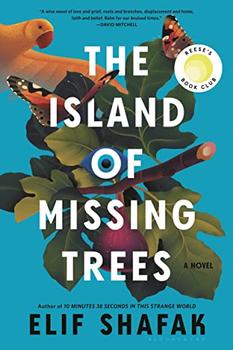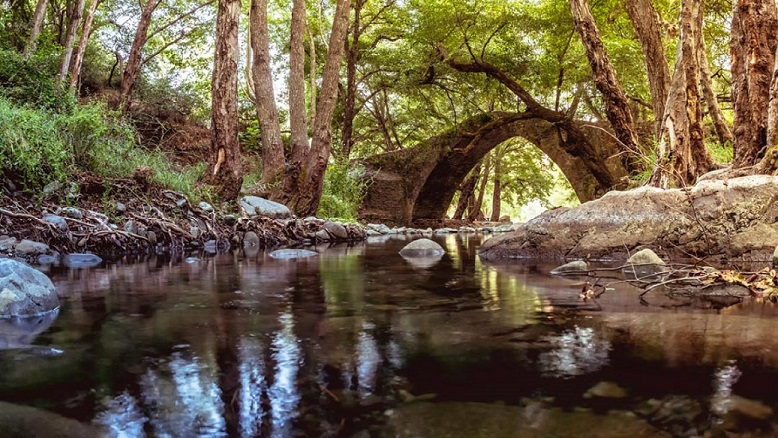Summary | Excerpt | Reading Guide | Reviews | Beyond the Book | Read-Alikes | Genres & Themes | Author Bio

Critics' Opinion:
Readers' Opinion:
First Published:
Nov 2021, 368 pages
Paperback:
Feb 2023, 368 pages
 Book Reviewed by:
Book Reviewed by:
Noshin Bokth
Buy This Book
This article relates to The Island of Missing Trees
 In Elif Shafak's The Island of Missing Trees, Kostas, one of the protagonists, can be described as having an intimate love affair with nature. The other characters, including Kostas's daughter, are often puzzled by his eccentric passion for the Earth and the creatures we share it with. Kostas grew up on the island of Cyprus, and he witnessed the growing tension between Greek and Turkish residents right before the 1974 civil war. Years of ethnic strife and colonialism have left indelible imprints upon the island. War evokes melancholy for human loss and suffering, yet we seldom consider and mourn the ecological devastation it inevitably causes. However, Kostas sees the Earth and its trees as inextricable to life. He gives the multitude of ecosystems that comprise the world their due respect and love. He has tender conversations with a fig tree and muses on the fact that avarice is unique to the human experience whilst nature works in a harmonious dance to ensure the life of all beings. In remembering the generational trauma of war and colonialism, Kostas includes the trauma of the trees and animals on Cyprus.
In Elif Shafak's The Island of Missing Trees, Kostas, one of the protagonists, can be described as having an intimate love affair with nature. The other characters, including Kostas's daughter, are often puzzled by his eccentric passion for the Earth and the creatures we share it with. Kostas grew up on the island of Cyprus, and he witnessed the growing tension between Greek and Turkish residents right before the 1974 civil war. Years of ethnic strife and colonialism have left indelible imprints upon the island. War evokes melancholy for human loss and suffering, yet we seldom consider and mourn the ecological devastation it inevitably causes. However, Kostas sees the Earth and its trees as inextricable to life. He gives the multitude of ecosystems that comprise the world their due respect and love. He has tender conversations with a fig tree and muses on the fact that avarice is unique to the human experience whilst nature works in a harmonious dance to ensure the life of all beings. In remembering the generational trauma of war and colonialism, Kostas includes the trauma of the trees and animals on Cyprus.
Humans often hold themselves superior to all other creatures, and this arrogance is manifested in warfare and colonialism. These have caused not only human loss, but a slow destruction of the ground below our feet. History can attest that humans have utilized nature for both self-defense and revenge on the battlefield. For example, deforestation often increases during conflicts. There is an increase in demand for wood and charcoal for fuel. Civilians and governments turn to resource extraction to finance conflicts and this results in severe environmental damage. The contending sides may employ scorched earth techniques such as the destruction of agricultural infrastructure like canals, wells and pumps, and the burning of crops. Although wars have been fought for many reasons, the consequence has always been the same — destruction. The effects warfare has upon the environment are woefully overlooked, and the little island of Cyprus and its arboreal life are no strangers to this brand of catastrophe.
Cyprus is located in the eastern Mediterranean, just south of Turkey. The island has a long and tumultuous history of contending with occupying powers. Because of its strategic geographical location and natural resources, empires have sought after its riches for at least 4,000 years, including the Assyrians, Egyptians, Persians, Greeks, Romans, Ottomans and British.
In the 19th century, colonization of this island helped Britain control access to Egypt's Suez Canal, a key trading route to India. In the 20th century, control over the eastern Mediterranean meant control of oil; and in the 21st century British military bases on Cyprus have been crucial to the country's role in the US conflicts in the Middle East.
Britain's involvement in Cyprus began in 1878 when the Ottoman Empire granted it administrative control in return for Britain supporting the Ottomans at the Congress of Berlin (a meeting of Europe's then six great powers to divvy up control of the Balkans in the wake of the Russo-Turkish War of 1877-78). Cyprus gained independence in 1960, but Britain continues to have a presence on the island because a proviso of independence was that it would retain three military bases there.
One of the more severe ramifications of British colonial rule was the exacerbation of a division between Cyprus's two major ethnic groups — the Greeks and the Turks, who had lived a relatively peaceful coexistence under the Ottomans. This came to a head in a cataclysmic civil war in 1974 when a Greek military coup intended to unite the island under Greek rule caused Turkey to invade, with the result that the country was divided between Turkish Northern Cyprus (approximately one-third of the island) and the Greek Cypriot Republic of Cyprus; and it remains so to this day.
Cyprus has long been known for its verdant forests. There is a misleading notion perpetuated by some British historians that when the colonizers arrived, the island was on the brink of despair, thus painting them as heroes. The British claim that when they entered Cyprus in 1878, they found the landscape degraded as a result of mistreatment from ignorant natives and past rulers. Thus, they came to the rescue, or so the story goes. This narrative allowed the British to justify their external rule.
The British preconceptions and misunderstandings about the Cyprus pastoral economy dictated their colonial mandates. For example, they misinterpreted the effects of grazing on vegetation, as well as fires and woodcutting and gathering by Cyprus shepherds. To the British, these were destructive habits that needed to be managed. On the contrary, such practices can play an essential role in maintaining balance in certain ecosystems. This is the case for the Mediterranean landscape in which grazing and burning, cutting, pruning and coppicing are all necessary for successful management of the land. British colonizers attributed unfamiliar agricultural practices to rural ignorance and the setting of fires to revenge, painting a stereotypical image of uneducated, wild inhabitants.
These spurious stories of native neglect have paved the way for lasting damage and trauma. Colonialism, warfare and human greed are detrimental to both the inhabitants of the world and the land, manipulating trees, flora and animals in order to gain ephemeral power, leaving behind a slowly decaying Earth and shattered generations.
Paphos Forest in Cyprus, courtesy of Argophilia
Filed under People, Eras & Events
![]() This "beyond the book article" relates to The Island of Missing Trees. It originally ran in November 2021 and has been updated for the
February 2023 paperback edition.
Go to magazine.
This "beyond the book article" relates to The Island of Missing Trees. It originally ran in November 2021 and has been updated for the
February 2023 paperback edition.
Go to magazine.





The House on Biscayne Bay
by Chanel Cleeton
As death stalks a gothic mansion in Miami, the lives of two women intertwine as the past and present collide.

The Flower Sisters
by Michelle Collins Anderson
From the new Fannie Flagg of the Ozarks, a richly-woven story of family, forgiveness, and reinvention.

The Funeral Cryer by Wenyan Lu
Debut novelist Wenyan Lu brings us this witty yet profound story about one woman's midlife reawakening in contemporary rural China.
Your guide toexceptional books
BookBrowse seeks out and recommends the best in contemporary fiction and nonfiction—books that not only engage and entertain but also deepen our understanding of ourselves and the world around us.